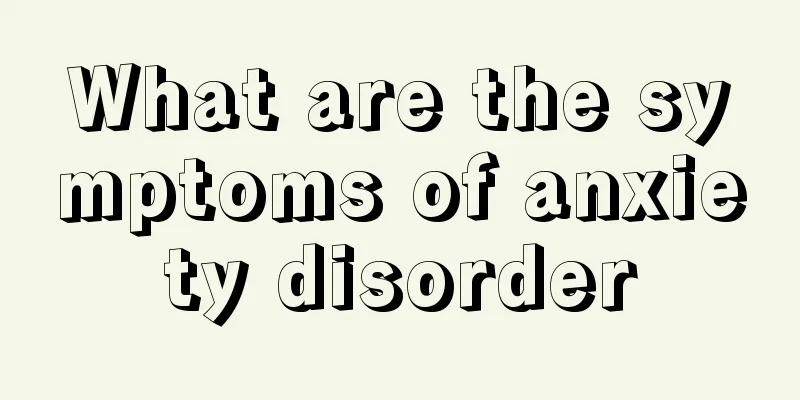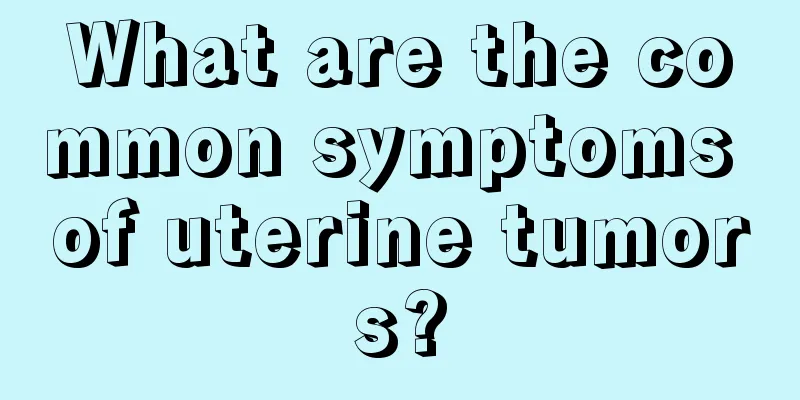What are the symptoms of anxiety disorder

|
Anxiety disorder is a persistent condition with anxiety and panic, which has a great impact on people's psychology and can cause severe discomfort to patients. There is no exact explanation for the cause of anxiety disorder, but it has a lot to do with personal lifestyle habits, genetic reasons, and family factors. So what are the symptoms of anxiety disorder? Symptoms of anxiety disorder: 1. Emotional state. Anxiety is an emotional state. The patient's basic inner experience is fear, such as being nervous, uneasy, or even extremely panic or terror. Paroxysmal or persistent occurrence of inexplicable fear, tension, anxiety, phobia, and uneasiness. The patient may have an anticipatory sense of danger, a sense that some kind of disaster is about to happen, or even a sense of death. Many patients also suffer from depressive symptoms and lack confidence and interest in their current and future lives. Sometimes I become emotional and lose my balance, often get angry for no reason, quarrel with family members, and am dissatisfied with everything. 2 Unhappiness and pain This emotion is unpleasant and painful. There may be a feeling of imminent death or of imminent collapse. People with anxiety disorders often feel that they cannot relax and their whole body is tense. His face was tense, his brows were furrowed, his expression was tense, and he sighed. 3. Overexaggeration of dangers There is actually no threat or danger. The anxiety and fear experienced by patients are very different from reality. That is, there is no actual threat or danger, or, measured by reasonable standards, the anxiety-provoking event is disproportionate to the severity of the anxiety. 4. Physical discomfort. Along with the anxiety experience, patients may also experience some physical discomfort, psychomotor restlessness and vegetative dysfunction. Physical discomfort is often an early symptom of anxiety disorder, such as palpitations, chest tightness, shortness of breath, discomfort or pain in the precordial area, rapid heartbeat, general fatigue, decreased ability to live and work, and simple daily housework becoming difficult and incompetent. Such symptoms, in turn, increase the patient's worry and anxiety, thus forming a vicious circle, seriously affecting people's physical and mental health. The vast majority of patients with mild anxiety disorders also have sleep disorders such as insomnia, early awakening, nightmares, hand tremors, finger tremors or numbness, irregular menstruation, loss of appetite, dizziness, fear and anxiety, and in severe cases, a sense of impending death. |
<<: What should I do if my nails have vertical stripes?
>>: What are the symptoms of lung yin deficiency?
Recommend
Symptoms and common signs of mediastinal malignant tumors
Generally, benign mediastinal tumors have no symp...
What treatments are needed after gastric cancer surgery? There are these treatments
Nutritional supplementation is needed in the earl...
Could there be a lot of bacteria in leftovers?
In China, many people have the habit of eating le...
What are the best ways to get rid of acne
Acne is common on the faces of adolescent boys an...
5 typical symptoms of laryngeal cancer
The clinical manifestations of laryngeal cancer v...
Is pancreatic cancer lymph node enlargement a sign of metastasis?
Pancreatic cancer patients may experience swollen...
How to prevent lipstick from fading?
Every woman should have a few lipsticks that suit...
What are the effects and functions of snake oil ointment
Snake oil ointment is a common cream in life. It ...
Can I get eyelash extensions when I am pregnant? Can I get eyelash extensions when I am pregnant?
We all know that women should try to avoid contac...
What are the symptoms of Qi deficiency and phlegm dampness constitution
Qi deficiency and phlegm-dampness is a relatively...
Which department of dentistry should I go to for wisdom tooth extraction
Wisdom teeth are a dental problem that has plague...
What are the wonderful uses of safflower oil
Safflower oil is a drug we use clinically to trea...
What to do with the scratches on your face from fighting
Some people think scars are beautiful, but some p...
Does grapefruit peel cause internal heat?
Grapefruit peel will not cause your body to get i...
Detailed explanation of the causes of rectal cancer
The occurrence of rectal cancer causes great harm...









